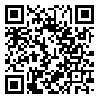Accepted Articles
Back to the articles list |
Back to browse issues page
1- National Drug Dependence Treatment Centre, Department of Psychiatry, All India Institute of Medical Sciences, New Delhi, India.
2- Faculty of Unani Medicine, Jamia Hamdard University, New Delhi, India.
2- Faculty of Unani Medicine, Jamia Hamdard University, New Delhi, India.
Abstract:
This study evaluates the effects of hydro-alcoholic root extract of Delphinium denudatum Wall (Jadwar, family; Ranunculaceae) for its ability to attenuate the nicotine-withdrawal in nicotine-dependent rats. The physical dependence on nicotine was induced in male adult Wistar albino rats (175-250 g) by subcutaneous implantation of Alzet mini osmotic pumps which supplied nicotine at 9.0mg/kg/day, while control rats received saline via osmotic pumps. For seven days four separate test doses of hydro-alcoholic root extract of Delphinium denudatum Wall (200, 400, 800, 1600 mg/kg) were given orally. On the 7th day, a mecamylamine injection (1 mg/kg, s.c.) was given to precipitate nicotine-withdrawal. The global Gellert’s–Holtzman rating scale was used to rate somatic signs of withdrawal for 15 minutes, followed by a measurement of motor activity. Drug Bupropion was used as a positive control. Serum levels of nicotine (cotinine) and corticosterone were done by ELISA. In nicotine-dependent rats, oral administration of Delphinium denudatum Wall root extract suppressed the hyper-locomotion and decreased the corticosterone levels at all dosages. Higher doses (800 and 1600 mg/kg) of extract, significantly attenuated nicotine withdrawal whereas, lower doses (200 and 400 mg/kg) had no significant effect. These results suggest that hydro-alcoholic root extract of Delphinium denudatum Wall may prove to be a potential therapeutic agent to attenuate nicotine dependence and facilitate tobacco smoking cessation.
Type of Study: Original |
Subject:
Behavioral Neuroscience
Received: 2020/05/17 | Accepted: 2020/11/7 | Published: 2022/09/11
Received: 2020/05/17 | Accepted: 2020/11/7 | Published: 2022/09/11
Send email to the article author
| Rights and permissions | |
 |
This work is licensed under a Creative Commons Attribution-NonCommercial 4.0 International License. |







